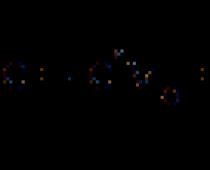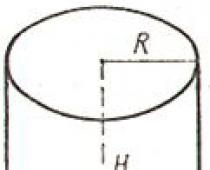Eagle 2011
1. Principles of organizing student work in the electronic distance learning system of the FDO 3
1.1. Student partESDO 3
1.2 Theory 4
1.3. Test 4
1.4 Coursework 6
1.5 Modular control 7
1.6 Boundary control 7
1.7 Mail 7
1.8 News 8
1.9 Gradebook 8
1.10 Output 8
1. Principles of organizing User Work in an electronic remote control systemFDO training
1.1. Student part of the ESDO
This is the main interface of the system, intended for registered students. After authorization at http://do. *****/ (Figure 2) the student has access to the “Navigation” panel and transitions to the main sections of the “Student” subsystem (Figure 3).
https://pandia.ru/text/78/443/images/image004_27.jpg" width="221" height="295">

1.2. Theory
After clicking on the “Theory” section on the “Navigation” panel, the student can view (download) theoretical material (guidelines, textbooks, manuals, etc.) on the disciplines studied in the current academic year (Figure 4).
Tests" href="/text/category/kontrolmznie_raboti/" rel="bookmark">tests for the current academic year, submit (send) completed tests to teachers for verification, view the results of checking the tests and information about admission to the final control knowledge in relevant disciplines (Figure 5).
https://pandia.ru/text/78/443/images/image008_17.jpg" width="387" height="128 src=">
Figure 6 – Student submitting a file with a test paper
After the student sends the file with the test work to the teacher, in the “Test” section in the “Result” column the status changes from “Did not pass” to “Under test”. If, after checking the test work, the teacher puts “Pass” or “Fail”, then the status in the “Test” section of the authorized student in the “Result” column will change to “Pass” or “Fail” accordingly. If the result is “Not passed” (Figure 7), then the student should open the teacher’s comment (review) on the test using the link “Pass test No. 1” from the “Pass test” column. After making corrections to the test work, you must attach the file with the test work using the “Review” button and resubmit (send) it to the teacher for checking by clicking the “Submit” button (Figure 8). After all tests in the relevant subject are passed, the student will receive admission to the final knowledge control (the status in the “Admission to final control” column will change from “No admission” to “Access”).
https://pandia.ru/text/78/443/images/image010_14.jpg" width="640" height="202 src=">
Figure 8 – Fragment of the “Test” menu (teacher’s comment, form for submitting a corrected test)
1.4. Coursework
In this section, a student can view (download) files with assignments for completing coursework for the current academic year, submit (send) completed coursework to teachers for verification, view the result of checking coursework (admission or non-admission to defend coursework) and information about admissions to the final control of knowledge in the relevant disciplines.
The technology for sending coursework to a teacher for review is similar to the technology for sending a test work described above.
In the “Coursework” section in the “Result” column of the “Coursework” section of an authorized student, the statuses may be “Did not pass”, “Under review”, “Not admitted to defense”, “Admitted to defense”. After receiving admission to defend the course work, the student must go to the ESDO according to the schedule and answer the teacher’s questions. Only after receiving a positive grade for defending a course work, a student receives access to Internet testing in this discipline.
1.5. Modular control
This section of the authorized student contains a list of disciplines indicating the examiner, hyperlinks to modular (intermediate) Internet testing and its result. For each discipline there are two unit tests per semester. Unit tests must be completed during the semester prior to the start of the session.
1.6. Frontier control
This section of the authorized student contains a list of disciplines indicating the examiner, type, date, status of the final control (Figure 9). According to the control date, a hyperlink to online testing appears in the “Control” column; after testing, its result is reflected.
https://pandia.ru/text/78/443/images/image012_15.jpg" width="642" height="303 src=">
Figure 10 – “Mail” section
1.8. News
This section displays in chronological order the news published by the ESDS administrator and teachers teaching the authorized student (Figure 11). If there is an unread message in the "News" section, the section title will contain the label "New". The tag will be removed after viewing the messages.
Internet cafe" href="/text/category/internet_kafe/" rel="bookmark">Internet cafe.
For questions regarding educational and methodological support for ESDO, you can contact the methodological department of the FDO by e-mail *****@***ru (head of department).
For questions regarding the operation of the ESDS, you can contact the information support department by e-mail *****@***ru (administrator of the ESDS), *****@***ru (head of the department).
Editor
Oryol State Technical University
License No. ID 00670 dated 01/01/2001.
Signed for publication 06/01/11. Format 60x84 1/16.
Offset printing. Uch. - ed. l. 1.8. Conditional oven 1.8l. Circulation 400 copies.
Order No._____
Printed from the finished original layout
https://pandia.ru/text/78/443/images/image015_14.gif" width="56" height="52"> on the printing base of the FDOFederal State Educational Institution of Higher Professional Education "State University - UNPC"
Federal State Budgetary Educational Institution of Higher Professional Education "State University - Educational, Research and Production Complex"
Institute of Open Distance Education.
Dear applicants!
FSBEI HPE "State University-UNPC" invites you to receive higher education by correspondence using e-learning and distance learning technologies at the Institute of Open Distance Education (IODE).
Graduates are issued state diploma.
What are e-learning (EL) and distance learning technologies (DET)?
Under EO is understood as the organization of educational activities using the information contained in databases and used in the implementation of educational programs and the information technologies, technical means that ensure its processing, as well as information and telecommunication networks that ensure the transmission of this information via communication lines, the interaction of students and teaching staff. Under bunker refers to educational technologies implemented mainly using information and telecommunication networks with indirect (at a distance) interaction between students and teaching staff.
How is training organized?
The educational process is organized with the traditional division into semesters and courses for Russian universities. Students study via the Internet under the guidance of teachers. The purpose of these classes is to orient students to independent work in completing elements of the curriculum (tests and coursework, etc.).
Coursework defense is carried out remotely using electronic information and educational environment (EIOS). Tests and exams are taken during the session in accordance with the schedule through the EIOS. Reports on internships, as well as defense of final qualifying work are carried out in person at the university.
To study through EIOS, you must have a computer and access to the Internet.
Advantages of EO and DOT:
Accessibility and comfort;
- individuality;
- independence from place of residence;
- training at a time convenient for the student;
- unlimited number of consultations;
- passing exams and tests without going to an educational institution.
Enrollment of students at IODE in 2015
Directions for bachelor's training.
Duration of training – 4 years 10 months.
38.03.01 – Economics (profile “Accounting, analysis and audit”).38.03.02 – Management (profile “Organization Management”). Budget places are available.
40.03.01 – Jurisprudence.
The cost of training is 14,080 rubles. in year.
For persons with secondary vocational education of the relevant profile, it is possible accelerated learning towards 38.03.01 – Economics (profile “Finance and Credit”).
Areas of master's training.
Duration of training – 2 years 5 months.
38.04.01 - Economy.38.04.03 - Personnel Management.
38.04.04 – State and municipal administration.
38.04.08 – Finance and credit.
The cost of training is 15,740 rubles. in year.
List of entrance examinations in areas of bachelor's training
40.03.01 – Jurisprudence:1. Social studies*
2. History
3. Russian language
38.03.01
- Economy;
38.03.02
– Management:
1. Mathematics*
2. Social studies
3. Russian language
Admission to the first year of bachelor's degree programs is carried out on the basis of the results of the Unified State Exam (USE) in general education subjects corresponding to the field of study.
When admitted to undergraduate programs, applicants with secondary or primary vocational education are admitted based on the results of entrance tests conducted by the university in the form of a written exam.
*For admission to the Federal State Budgetary Educational Institution of Higher Professional Education "State University - UNPC" under contracts for the provision of paid educational services on the basis of higher education, the university establishes one general educational entrance test in the form of a written exam.
State educational institution
higher professional education
ORYOL STATE
TECHNICAL UNIVERSITY
(state license No. A 001219,
certificate of state accreditation No. A 001121)
The Faculty of Distance (correspondence) education offers:

possibility of interactive interaction
with teachers and dean's office!!!
Faculty of Distance Learning

The educational process at the Faculty of Distance Learning of Orel State Technical University is structured with the traditional division into semesters and courses for Russian universities. Training in each semester consists of four cycles (modules). Each module lasts 4 weeks: two weeks of classroom training and two weeks of independent study. All classes at the Faculty of Distance Learning of Orel State Technical University are conducted in the form of group consultations or ongoing monitoring of progress and are of a review, advisory nature and guide the independent work of students.
The form of training is correspondence with the use of distance technologies.
Classes are held in the evening on some days of the week, as well as in the form of Saturday and Sunday schools. Each completed section of the course is controlled by your teacher-tutor (tests, tests, essays, etc.). To communicate with teachers, telephone, fax, e-mail, and the Internet are used.
During the training period, each student is provided with a set of educational materials - (all educational materials are issued to the student for free
). These are not ordinary textbooks, but teaching aids and guidelines specially developed at Orel State Technical University for completing coursework and tests, assignments for independent work on various media - traditional paper, CD, DVD, audio and video media. 
During training, in addition to teaching aids and guidelines for completing tests and coursework, a student of the distance learning faculty has the opportunity to use the resources and services of the Orel State Technical University Scientific Library (http://www.ostu.ru/libraries). If any questions arise regarding the educational or organizational component of the educational process at the Orel State Technical University, the student can get direct advice from the teacher or the dean's office.
The student can consult with the teacher via e-mail or the OrelSTU web forum, ask questions about the topic of classes, tests or coursework. On the website of the Faculty of Distance Learning www.ostu.ru/vzido, a student can find out the schedule, news, view all current announcements, as well as information related to training.
During the semester, the student must pass all control tasks provided for in the curriculum (tests, essays, coursework, tests). Next, students take an examination session. Exams and tests are conducted only in person at the center (representative office) of distance learning at Oryol State Technical University. Students of the distance learning faculty of Orel State Technical University receive a certificate of invitation to the session with paid leave and preservation of the average salary - for 40 days in the first and second years and 50 days in senior years.
Defending some coursework and passing test assignments can be carried out at a distance using the Electronic Distance Learning System of Orel State Technical University http://www.ostu.ru/distant/do/ and e-mail.
The Faculty of Distance Learning provides the opportunity for full-fledged distance learning via the Internet to the following categories of citizens:
- persons who have medical restrictions to receive regular education at universities;
- persons serving on active duty in the ranks of the Russian Armed Forces, the Ministry of Internal Affairs and border troops;
- persons whose specific work does not allow them to study in the rhythm of current educational technologies (for example, shift workers, athletes, etc.).
Distance learning fully involves mandatory
the student has access to the Internet and e-mail. By email, the student sends his completed tests and coursework, essays and tests to the teacher for verification. Tests and exams are taken on-line via email or on a specialized web page of the Faculty of Distance Learning of Orel State Technical University.
The Faculty is a leader in testing and introducing new educational technologies. For the first time at Orel State Technical University, the Faculty of Distance Learning has implemented a WEB server to support the educational process. The faculty staff takes an active part in establishing domestic and international relations in the field of distance learning.

In the photo are participants of the international seminar on the Tempus Tacis program in Reims (France, 09.28.06) / first on the right - deputy. Dean of the Faculty of Education, Ph.D. Derley A. N.; third from the right – Doctor of Technical Sciences Stepanov Yu. S.; third from left – Doctor of Historical Sciences Aronov D.V.
The next stage in the development of distance learning technology is the implementation of on-line distance learning technologies. Their main task is to eliminate time delays in communication between a student and a teacher, as well as the possibility of visual identification of a student when monitoring his knowledge.
The implementation of on-line technology in distance learning is effective and possible if there are relatively large consulting centers. The Faculty of Distance Learning of Orel State Technical University, which has a modern technical and information base and a developed network of branches and representative offices, is a ready-made platform for the implementation of on-line distance learning technologies.
Existing and developing distance learning technologies make it possible to convey high-quality educational and methodological information to the student, provide student-teacher feedback for the student’s operational questions and ensure reliable control of students’ knowledge.
The Faculty of Distance Learning of Orel State Technical University continues to modernize the software complex (Electronic system of distance learning of Orel State Technical University http://www.ostu.ru/distant/do/), which provides support and organization of the educational process at a qualitatively new level through distance technologies, based on the interactive interaction of remote participants educational process (applicants, students, students, teachers, university administration, etc.) through open Internet access channels.
Specialties at the Faculty of Distance Learning of Orel State Technical University:
- In contact with 0
- Google+ 0
- OK 0
- Facebook 0
Orel
080801 “Applied computer science” (18,000 rubles per year)
Livny
030501 “Jurisprudence” (20,000 rubles per year)
080109 “Accounting, analysis and audit” (18,000 rubles per year)
080107 “Taxes and taxation” (18,000 rubles per year)
Mtsensk
030501 “Jurisprudence” (20,000 rubles per year)
080109 “Accounting, analysis and audit” (18,000 rubles per year)
080111 “Marketing” (15,000 rubles per year)
080507 “Organization Management” (RUB 15,000 per year)








